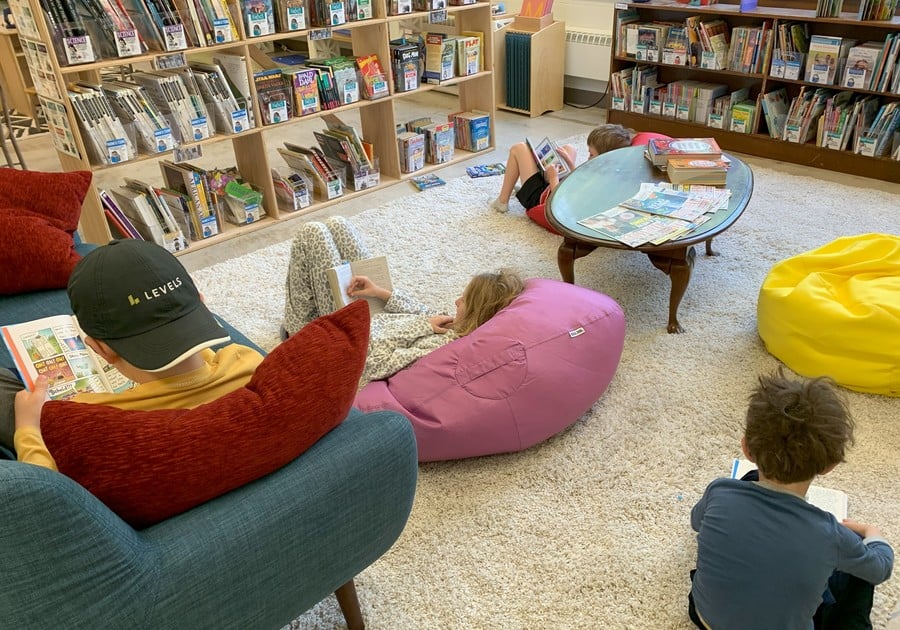Why does it matter that children not only know how to read, but also love to read? Because reading for pleasure is linked with not just better academic and cognitive outcomes, but also to better social and emotional outcomes. For instance, children who read for pleasure also have:
- Greater engagement and higher motivation in school
- Stronger communication and relations with family
- Positive friendships and less risky behavior
- Increased empathy and social skills
- Improved health and wellbeing (i.e. reading is relaxing)
- More enjoyment and stimulation of the imagination
Yet, reading for fun is on the decline in the U.S. The media recently reported that math and reading scores for 13-year-olds hit the lowest levels in decades. Additionally concerning, was a decline in the percentage of students who report they read for fun. According to ABCNews:
“Asked about their reading habits, fewer students than ever say they’re reading for fun every day. Just 14% reported daily reading for pleasure — which has been tied to better social and academic outcomes — down from 27% in 2012. Almost a third of students said they never or hardly ever read for fun, up from 22% in 2012.”
How can you help to ensure children love to read at any age? Below are some tips that we utilize at Acton Academy Madison West where reading for pleasure is an integral part of our learning design. We have found that children at our school love reading and develop into voracious readers over time. This is how we do it:
- Let them choose what they read. Children do more leisure reading when they choose the reading material. Providing children with the freedom to select books leads to positive attitudes towards reading, greater engagement with books, and more enjoyable reading experiences. This also means allowing children to read whatever materials they find interesting, be it comics, graphic novels, magazines, or poetry.
- Drop everything and read (D.E.A.R.) At Acton Academy Madison West, we schedule at least 30 minutes a day to “Drop Everything and Read.” It’s a relaxing time where children have the space to immerse themselves in the stories and genres that interest them. Carve out a time in your daily or weekly schedule to D.E.A.R. You might be surprised how children take to it. We find that children at our school are excited when it’s D.E.A.R. time. And when they have found a good book they can’t put down, they even use their free time to read independently for fun. PS - D.E.A.R. time also works for younger children whose reading readiness is developing. Allow them to flip through and explore picture books and learn to love this relaxing time.
- Use audiobooks and podcasts to foster a love of stories. While there are cognitive benefits to listening to audiobooks - listening to a book requires the same cognitive skills as reading in print, and supports the development of language comprehension and the ability to understand and retain information - they are also fun. Listening to audiobooks and podcasts are a great way to help children learn to love stories. And if children love stories, they will develop an intrinsic motivation to read so they can access even more stories. Some of our favorite podcasts are Stories Podcast, Greeking Out and Brains On, but there are many, many more geared towards children of all ages (and they are a wonderful tool for long car rides!).
- Swap books for screens and stash books everywhere. Are there times and places in the day that you can swap books for screens? For instance, on car rides, airplanes, in the bathroom, after school or before bedtime? Stash books all around the house and in your car, at a level accessible to children, and they will pick up and read the books for entertainment when they don’t have the fallback of screens.
- Let children stay up a little later to read. This is one way to schedule a little extra D.E.A.R. time into the day. As our son grew up and was ready for a later bedtime, rather than push back the bedtime routine start-time, we added independent reading time to the routine. Now, every night he spends an extra half hour reading on his own. He is still getting all the sleep he needs, but he now associates reading for fun with the special treat of staying up “late,” even though he is going to bed right on time.
- Trust children to read when they are ready. Not every child is interested or ready to read in Kindergarten. Some may not show interest in reading until they are six or seven. Assuming your child is receiving phonics instruction at school, there is no reason to push. Learning to read is a developmental milestone, much like learning to walk. In fact, pushing can be counterproductive, resulting in frustration and an aversion to reading. Rather, continue to read aloud to and with your child while making books accessible and available to them. When they are ready to read more on their own, they already will have developed the interest in stories and other wonders that books contain, to motivate them to start reading independently.
About Acton Academy Madison West / www.actonmadison.com
Parents are frustrated with the old, traditional educational model that teaches students to check boxes and spit out facts. At Acton Academy, we believe learning should be an adventure – unique to each student – preparing them to bring their own special genius to the world. We use hands-on engagement in a self paced learning environment that fosters responsibility, goal-setting, and teamwork. Acton students are empowered to thrive in a world that needs independent, motivated thinkers and learners.
This post originally appeared on the Acton Academy blog.
Want more parenting advice, resources, activities and events? Sign up for our free weekly Macaroni KID Madison newsletter and (also a great read) and check our FULL calendar so you never miss a thing!




